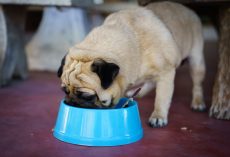Feeding time is here and your pooch is starving! Read on to find out what healthy ingredients you have in your kitchen your doggy will love.
Just as with the diet you feed yourself and your family, feeding a wide variety of healthy foods in appropriate proportions should meet the needs of most healthy dogs.
Too often, people think that they’re feeding a healthy diet when key ingredients may be missing or are fed in excess.
Complete and Balanced
It’s important that the diet you feed your dog is “complete and balanced,” meaning it meets all of your dog’s nutritional needs.GUIDELINES
Except where specified, foods can be fed either raw or cooked. Leftovers from your table can be included as long as they’re foods you would eat yourself, not fatty scraps.
Meat and Other Animal Products: Should always make up at least half of the diet.
Raw Meaty Bones (optional): If you choose to feed them, RMBs should make up one third to one half of the total diet.
Boneless Meat: Include both poultry and red meat. Heart is a good choice, as it is lean and often less expensive than other muscle meats.
Fish: Canned fish with bones, such as sardines (packed in water, not oil), jack mackerel, and pink salmon, are good choices. You can feed small amounts of fish daily, or larger amounts once or twice a week.
Organs: Feeding small amounts of liver daily or every other day is preferable to feeding larger amounts less often.
Eggs: Highly nutritious addition to any diet. Dogs weighing about 20 pounds can have a whole egg every day, but give less to smaller dogs.
Dairy: Cottage and ricotta cheese are also good options. Limit other forms of cheese, as most are high in fat.
Fruits and Vegetables: While not a significant part of the evolutionary diet of the dog and wolf, fruits and vegetables provide fiber that supports digestive health, as well as antioxidants and other beneficial nutrients that contribute to health and longevity.
Starchy Vegetables: Veggies such as potatoes, sweet potatoes, and winter squashes (including pumpkin), as well as legumes (beans), provide carbohydrate calories that can be helpful in reducing food costs and keeping weight on skinny and very active dogs.
Leafy Green and Other Non-Starchy Vegetables: Raw vegetables must be pureed in a food processor, blender, or juicer in order to be digested properly by dogs, though whole raw veggies are not harmful and can be used as treats.
Fruits: Bananas, apples, berries, melon, and papaya are good choices.
Grains: Many dogs do fine with grains, however, and they can be used to reduce the overall cost of feeding a homemade diet.
Grains and starchy veggies should make up no more than half the diet.
SUPPLEMENTS
Some supplements are required. In addition, the longer food is cooked or frozen, the more nutrients are lost. Here are some supplements to consider:Calcium: Give 800 to 1,000 mg calcium per pound of food (excluding non-starchy vegetables).
Oils: Most homemade diets require added oils for fat, calories, and to supply particular nutrients.
Fish Oil: Give an amount that provides about 300 mg EPA and DHA combined per 20 to 30 pounds of body weight on days you don’t feed fish.
Cod Liver Oil: Provides vitamins A and D as well as EPA and DHA. Can be combined with other fish oil to increase the amount of EPA and DHA if desired.
Plant Oils: If you don’t feed much poultry fat, found in dark meat and skin, linoleic acid, an essential omega-6 fatty acid, may be insufficient. You can use walnut, hempseed, corn, vegetable (soybean), or high-linoleic safflower oil to supply linoleic acid if needed. Add about one teaspoon of oil per pound of meat and other animal products, or twice that amount if using canola or sunflower oil.
Other Vitamins and Minerals: In addition to vitamin D discussed above, certain vitamins and minerals may be short in some homemade diets, particularly those that don’t include organ meats or vegetables.
Vitamin E: All homemade diets I’ve analyzed have been short on vitamin E, and the need for vitamin E increases when you supplement with oils.
Iodine: Too much or too little iodine can suppress thyroid function, and it’s hard to know how much is in the diet.
Multivitamin and mineral supplements: A multivitamin and mineral supplement will help to meet most requirements, including iodine and vitamins D and E, but it’s important not to over supplement minerals.
Green Blends: Often containing alfalfa and various herbs, green blends may be especially helpful if you don’t include many green vegetables in your dog’s diet.
That was a huge load of helpful information! Your doggy will definitely benefit from the yummy home cooked meals you'll be making him! You might want to start training him to help you wash those dishes after each meal! LOL!
To learn more about healthy home cooked meals for your pooch be sure to check out The Whole Dog Journal.









